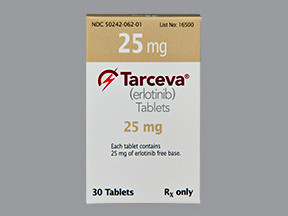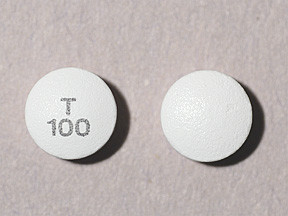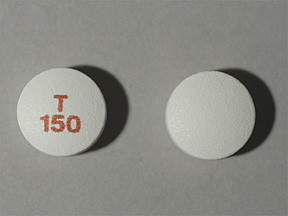ERLOTINIB - ORAL
PHONETIC PRONUNCIATION: (er-LOE-ti-nib)
COMMON BRAND NAME(S): Tarceva
GENERIC NAME(S): erlotinib HCl
Uses
USES: Erlotinib is used to treat lung and pancreatic cancer. It works by slowing or stopping the growth of cancer cells.
How to use ERLOTINIB - ORAL
HOW TO USE: Take this medication by mouth on an empty stomach (at least 1 hour before or 2 hours after a meal) as directed by your doctor, usually once daily. The dosage is based on your medical condition, response to treatment, and other medications you may be taking. Be sure to tell your doctor and pharmacist about all the products you use (including prescription drugs, nonprescription drugs, and herbal products). Medications that lower stomach acid (such as antacids, H2 blockers including ranitidine) may prevent erlotinib from working. Ask your doctor or pharmacist how to use these medications safely with erlotinib. Avoid eating grapefruit or drinking grapefruit juice while using this medication unless your doctor or pharmacist says you may do so safely. Grapefruit can increase the chance of side effects with this medicine. Ask your doctor or pharmacist for more details. Use this medication regularly to get the most benefit from it. To help you remember, take it at the same time each day. Do not increase your dose or use this drug more often or for longer than prescribed. Your condition will not improve any faster, and your risk of serious side effects will increase. Since this drug can be absorbed through the skin and lungs and may harm an unborn baby, women who are pregnant or who may become pregnant should not handle this medication or breathe the dust from the tablets.
Side Effects
Precautions
Interactions
Overdose
Images
Reviews
Faq for ERLOTINIB - ORAL
- Erlotinib is used to treat non-small cell lung cancer that has spread to other parts of the body or that cannot be removed through surgery.
- Erlotinib is a targeted therapy that inhibits the activity of a specific protein (epidermal growth factor receptor) that is responsible for the growth and spread of cancer cells.
- Erlotinib should be taken by mouth on an empty stomach, at least one hour before or two hours after eating. It is usually taken once a day unless otherwise directed by your doctor.
- Common side effects of Erlotinib include rash, diarrhea, loss of appetite, nausea, abdominal pain, mouth sores, and cough. Seek medical attention if you experience severe or persistent side effects.
- It is important to inform your doctor about all the medications, supplements, and herbal products you are currently taking as some may interact with Erlotinib. Your doctor will advise you on potential interactions and provide guidance.
- The duration of Erlotinib treatment depends on the individual and the response to the medication. It may be used as long as it continues to be effective and the benefits outweigh the risks.
- Erlotinib is not a cure for cancer, but it is used to slow down the growth and spread of cancer cells, prolonging the survival time and improving the quality of life for patients with non-small cell lung cancer.
- Erlotinib may cause serious lung and liver problems. It is important to notify your doctor if you have a history of lung or liver disease, as well as any other medical conditions or allergies before starting treatment.
- It is recommended to avoid consuming alcohol while taking Erlotinib as it may increase the risk of liver problems and worsen certain side effects.
Disclaimer
IMPORTANT: HOW TO USE THIS INFORMATION: This is a summary and does NOT have all possible information about this product. This information does not assure that this product is safe, effective, or appropriate for you. This information is not individual medical advice and does not substitute for the advice of your health care professional. Always ask your health care professional for complete information about this product and your specific health needs.




No Reviews Yet